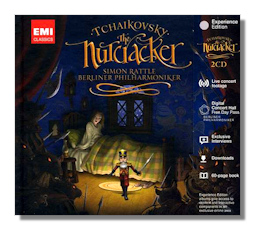
The Internet's Premier Classical Music Source
Related Links
- Tchaikovsky Reviews
- Latest Reviews
- More Reviews
-
By Composer
-
Collections
DVD & Blu-ray
Books
Concert Reviews
Articles/Interviews
Software
Audio
Search Amazon
Recommended Links
Site News
 CD Review
CD Review
Piotr Ilyitch Tchaikovsky

The Nutcracker
Berlin Philharmonic Orchestra/Simon Rattle
EMI 631621-2 DDD 2CDs Deluxe Edition
Also available on regular CD 463852-2:
Amazon
- UK
- Germany
- Canada
- France
- Japan
- ArkivMusic
- CD Universe
- JPC
It's rare that a conductor admits in the liner notes to his new disc that he hasn't always been much of a fan of the composer he is playing. But then again anyone familiar with the career of Sir Simon Rattle may have noticed he has so far been avoiding the music of Tchaikovsky like some rare disease. The release of a complete Nutcracker with the Berlin Philharmonic, moreover to mark Rattle's 30th anniversary as recording artist with EMI, therefore has our undivided attention.
In a CD release of The Nutcracker, or indeed any ballet music, we don't expect to hear an accompaniment of dancers or stage action with all its varying choreographic or theatrical requirements, but we are entitled to more than a divertissement of beautifully played numbers. For all its pink tutus and lemonade fountains that we now associate with The Nutcracker, it is a pretty serious score, with plenty of dark undertones, as much connected to Tchaikovsky's interpretation of the bizarre tale from E.T.A. Hoffmann (Nussknacker und Mausekönig) which initially inspired the ballet, as to the composer's inclination, in the autumn of his life, to tinge even the most festive of music with sadness.
However, what immediately strikes in Rattle's recording, which is a half studio-half live (the 2nd act was performed at the traditional Silvesterkonzert from 2009), is the lack of imagination and atmosphere. While Rattle rightfully emphasizes in the liner notes Tchaikovsky's innovative orchestration – strongly influential on Stravinsky – his reading remains too laidback and polished to convince us it actually is. We are hearing some elegantly played snapshots, but Rattle hardly ever digs into the music, nor does he give us much of a story. In fact he seems to be discovering the score and appears too mesmerized by the wealth of its melodies ("the fountain of melodic adventure", as he calls it) to present a dramatically convincing whole.
The opening, setting the scene for a cozy Christmas evening, is played so uninvitingly off-hand that all you want to do is leave right away and look for a more promising party. The Berlin Philharmonic luxuriously wallows in its own virtuosity, yet it all sounds too much of a slick beauty contest without a beating heart. Although expansively recorded the weightier moments in the music lack bite as if Rattle seems to hold back in the climaxes. Bizarrely enough for a conductor well versed in playing symphonic music his reading lacks the sweep that can make the second part of the 1st act such a thrilling ride. After a timid and unexciting battle between the toy soldiers and the mice, "In The Pine Forest" is hesitant and disregards the sense of discovery and magic of this scene. He finds plenty of sparkle in the national dances of the 2nd act, although the famous "Waltz of the flowers" remains rather pedestrian and the following Pas de deux never really blooms.
The EMI recording has warmth but also lacks detail and clarity, which enhances the impression of smooth elegance yet robs this brilliant score of its impact. Strings and woodwinds are balanced forwardly and during the orchestral climaxes timpani still have this somewhat indistinct, distant rumble from the later Karajan days. Kudos, though, for the presentation of this release, offered as a beautifully illustrated miniature hardcover book of some 60 pages, including besides Rattle's foreword, an essay on the history of the ballet (by specialist John Warrack), a synopsis and notes on the Berlin Philharmonic and the conductor.
Other conductors have given us far more satisfying readings of this score. Here are a few that stood the test of time: Ernest Ansermet, finding character in every note; Antal Doráti, especially in his later recording with the Concertgebouw Orchestra Amsterdam, beautifully blending the symphonic quality of the score with a sense of choreography; Semyon Bychkov with a Berlin Philharmonic sounding far more inspired in 1986; Valery Gergiev with the Mariinsky Orchestra in one of his very best moments preserved on disc. For a selection of excerpts, Yevgeni Mravinsky with the Leningrad Philharmonic remains required listening.
Copyright © 2011, Marc Haegeman





















